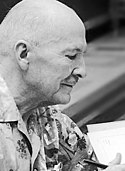Robert A. Heinlein Quote
There are a dozen different ways of delivering destruction in impersonal wholesale, via ships and missiles of one sort or another, catastrophes so widespread, so unselective, that the war is over because that nation or planet has ceased to exist. What we do is entirely different. We make war as personal as a punch in the nose. We can be selective, applying precisely the required amount of pressure at the specified point at a designated time . . . .We are the boys who go to a particular place, at H-hour, occupy a designated terrain, stand on it, dig the enemy out of their holes, force them then and there to surrender or die. We're the bloody infantry, the doughboy, the duckfoot, the foot soldier who goes where the enemy is and takes him on in person. We've been doing it, with changes in weapons but very little change in our trade, at least since the time five thousand years ago when the foot sloggers of Sargon the Great forced the Sumerians to cry "Uncle!"Maybe they'll be able to do without us someday. Maybe some mad enius with myopia, a bulging forehead, and a cybernetic mind will devise a weapon that can go down a hole, pick out the opposition, adn force it to surrender or die--without killing that gang of your own people they've got imprisoned down there. I wouldn't know; I'm not a genius, I'm an M.I. In the meantime, until they build a machine to replace us, my mates can handle that job--and I might be some help on it, too.
There are a dozen different ways of delivering destruction in impersonal wholesale, via ships and missiles of one sort or another, catastrophes so widespread, so unselective, that the war is over because that nation or planet has ceased to exist. What we do is entirely different. We make war as personal as a punch in the nose. We can be selective, applying precisely the required amount of pressure at the specified point at a designated time . . . .We are the boys who go to a particular place, at H-hour, occupy a designated terrain, stand on it, dig the enemy out of their holes, force them then and there to surrender or die. We're the bloody infantry, the doughboy, the duckfoot, the foot soldier who goes where the enemy is and takes him on in person. We've been doing it, with changes in weapons but very little change in our trade, at least since the time five thousand years ago when the foot sloggers of Sargon the Great forced the Sumerians to cry "Uncle!"Maybe they'll be able to do without us someday. Maybe some mad enius with myopia, a bulging forehead, and a cybernetic mind will devise a weapon that can go down a hole, pick out the opposition, adn force it to surrender or die--without killing that gang of your own people they've got imprisoned down there. I wouldn't know; I'm not a genius, I'm an M.I. In the meantime, until they build a machine to replace us, my mates can handle that job--and I might be some help on it, too.
Related Quotes
About Robert A. Heinlein
Heinlein became one of the first American science-fiction writers to break into mainstream magazines such as The Saturday Evening Post in the late 1940s. He was one of the best-selling science-fiction novelists for many decades, and he, Isaac Asimov, and Arthur C. Clarke are often considered the "Big Three" of English-language science fiction authors. Notable Heinlein works include Stranger in a Strange Land, Starship Troopers (which helped mold the space marine and mecha archetypes) and The Moon Is a Harsh Mistress. His work sometimes had controversial aspects, such as plural marriage in The Moon Is a Harsh Mistress, militarism in Starship Troopers and technologically competent women characters who were formidable, yet often stereotypically feminine—such as Friday.
Heinlein used his science fiction as a way to explore provocative social and political ideas and to speculate how progress in science and engineering might shape the future of politics, race, religion, and sex.
Within the framework of his science-fiction stories, Heinlein repeatedly addressed certain social themes: the importance of individual liberty and self-reliance, the nature of sexual relationships, the obligation individuals owe to their societies, the influence of organized religion on culture and government, and the tendency of society to repress nonconformist thought. He also speculated on the influence of space travel on human cultural practices.
Heinlein was heavily influenced by the visionary writers and philosophers of his day. William H. Patterson Jr., writing in Robert A. Heinlein: In Dialogue with His Century, states that by 1930, Heinlein was a progressive liberal who had spent some time in the open sexuality climate of New York's Jazz Age Greenwich Village. Heinlein believed that some level of socialism was inevitable and was already occurring in America. He was absorbing the social concepts of writers such as H. G. Wells and Upton Sinclair. He adopted many of the progressive social beliefs of his day and projected them forward.
Heinlein was named the first Science Fiction Writers Grand Master in 1974. Four of his novels won Hugo Awards. In addition, fifty years after publication, seven of his works were awarded "Retro Hugos"—awards given retrospectively for works that were published before the Hugo Awards came into existence. In his fiction, Heinlein coined terms that have become part of the English language, including grok, waldo and speculative fiction, as well as popularizing existing terms like "TANSTAAFL", "pay it forward", and "space marine". He also anticipated mechanical computer-aided design with "Drafting Dan" in his novel The Door into Summer and described a modern version of a waterbed in his novel Stranger in a Strange Land.
